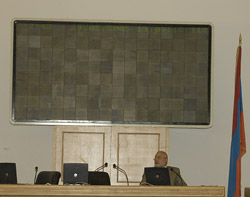The media and politics go together in Armenia and there are two issues on which both agree on. The first is the number of political parties in Armenia and the second concerns the parliament. Both pro-government and the pro-opposition media talk about these issues with irony.
Let’s start out with the parliament, or National Assembly. No matter how surprising it may sound, the pro-government and pro-opposition media keep talking about how lame and unintelligent MPs are. There is just one difference: the oppositional media uses names while the pro-government press just writes phrases referring to this or that MP. For example, the pro-government television program host supports any decision made by the authorities, but tends to speak in a different tone when talking about the National Assembly (this may signal irony). It seems as though the word “MP” has turned into a curse word. It’s interesting, isn’t it? The press continuously spread the propaganda on the constitutional amendments referendum, claiming that it would increase the role that the National Assembly plays, but at the same time the press was ridiculing the National Assembly.
The ones to blame are, first and foremost, the MPs, but that doesn’t really change the reality of it all. The parliament is not a union of certain people, but rather it is a state body of high importance. The MPs of today will be substituted for others in the future. But it turns out that even if good MPs are elected in the upcoming 2007 elections (or 2011), it doesn’t matter because the National Assembly’s reputation is going to be so low that it won’t be able to fully serve the executive body, in other words, the president of the country. In other words, the people that are asking the press to “destroy” the National Assembly are only solving one issue: to keep the president’s absolute power. As for journalists, they are content because they are given “freedom of speech” and dare to go against the National Assembly. As a result, the victim is one of the key factors of democracy-the National Assembly. Basically, democracy is the victim. But apparently nobody cares about these kinds of issues in Armenia, much less the pro-government media. First, journalists say the parliamentary elections were a success and that they were fair, but then they say the opposite. Any base for the “ideology” of an absolute or authoritarian country starts out like this.
The press also doesn’t talk about the number of political parties. There are even some journalists who come up with numbers and say that is too much for Armenia and that Armenia needs a maximum of 10 political parties. Journalists often compete against each other to see who will come up with fake numbers and even tell jokes. “Political party member” has started to take on the word “careerist”. As soon as someone founds a political party or joins one, the press starts to find out why that person did that and what kind of position he wants. Basically, the mentality of the people is that political parties are just formal. Political figures themselves declare that “they are not members of political parties” with pride without realizing that there is nothing really to be proud of and that they are no better than the political party members.
Journalists have one goal for throwing the multi-political party system’s reputation down: to show society that although it is considered normal to have an inter-political struggle in democratic countries, however, that just doesn’t work out in Armenia and it is even absurd. In Armenia, political parties don’t struggle with ideologies, but rather with force and money. So, the journalist that ridicules the multi-political party system is actually making fun of democracy.
Overall, it’s nothing serious. Democracy is not saint and it can be ridiculed. We must simply understand that a country’s parliament (or government for that matter) is formed through elections and whoever makes fun of that is paving the path for giving absolute power to the president and freedom to the authorities.

